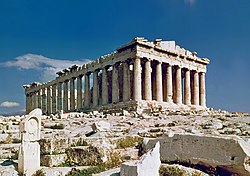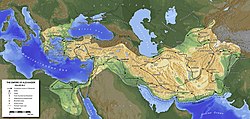
Test Content 1
Greece,[c] officially the Hellenic Republic,[d] is a country in Southeast Europe. Located on the southern tip of the Balkan peninsula, it shares land borders with Albania to the northwest, North Macedonia and Bulgaria to the north, and Turkey to the east. The Aegean Sea lies to the east of the mainland, the Ionian Sea to the west, and the Sea of Crete and the Mediterranean Sea to the south. Greece has the longest coastline on the Mediterranean Basin, spanning thousands of islands and nine traditional geographic regions. It has a population of over 10 million. Athens is the nation's capital and largest city, followed by Thessaloniki and Patras.
Greece is considered the cradle of Western civilisation and the birthplace of democracy, Western philosophy, Western literature, historiography, political science, major scientific and mathematical principles, theatre, and the Olympic Games. The Ancient Greeks were organised into independent city-states, or poleis (singular polis), that spanned the Mediterranean and Black seas. Philip II of Macedon united most of present-day Greece in the fourth century BC, with his son Alexander the Great conquering much of the known ancient world from the Near East to northwestern India. The subsequent Hellenistic period saw the height of Greek culture and influence in antiquity. Greece was annexed by Rome in the second century BC and became an integral part of the Roman Empire and its continuation, the Byzantine Empire, where Greek culture and language were dominant. The Greek Orthodox Church, which emerged in the first century AD, helped shape modern Greek identity and transmitted Greek traditions to the wider Orthodox world.
After the Fourth Crusade in 1204, Greece was fragmented into several polities, with most Greek lands coming under Ottoman control by the mid-15th century. Following a protracted war of independence in 1821, Greece emerged as a modern nation state in 1830. The Kingdom of Greece pursued territorial expansion during the Balkan Wars of 1912 and 1913 and the First World War (1914 to 1918), until its defeat in the Asia Minor Campaign in 1922. A short-lived republic was established in 1924 but faced civil strife and the challenge of resettling refugees from Turkey. In 1936 a royalist dictatorship inaugurated a long period of authoritarian rule, marked by military occupation during the Second World War, an ensuing civil war, and military dictatorship. Greece transitioned to democracy in 1974–75, leading to the current parliamentary republic.
Having achieved record economic growth from 1950 to 1973, Greece is a developed country with an advanced high-income economy; shipping and tourism are major economic sectors, with Greece being the ninth most-visited country in the world in 2024. Greece is part of multiple international organizations and forums, being the tenth member to join what is today the European Union in 1981. The country's rich historical legacy is reflected partly by its 20 UNESCO World Heritage Sites.
Name
The native name of the country in Modern Greek is Ελλάδα (ⓘ, pronounced [eˈlaða] ⓘ). The corresponding form in Ancient Greek and conservative formal Modern Greek (Katharevousa) is Ἑλλάς (Hellas, classical: [hel.lás], modern: [eˈlas]). This is the source of the English alternative name Hellas, which is mostly found in archaic or poetic contexts today. The Greek adjectival form ελληνικός (ellinikos, [eliniˈkos]) is sometimes also translated as Hellenic and is often rendered in this way in the formal names of Greek institutions, as in the official name of the Greek state, the Hellenic Republic (Ελληνική Δημοκρατία, [eliniˈci ðimokraˈti.a]).[12]
The English names Greece and Greek are derived, via the Latin Graecia and Graecus, from the name of the Graeci (Γραικοί, Graikoí), one of the first ancient Greek tribes to settle Magna Graecia in southern Italy.
History
Prehistory and Aegean civilisations

The Apidima Cave in Mani, in southern Greece, has been suggested to contain the oldest remains of early modern humans outside of Africa, dated to 200,000 years ago.[13] However others suggest the remains represent archaic humans.[14] All three stages of the Stone Age are represented in Greece, for example in the Franchthi Cave.[15] Neolithic settlements in Greece, dating from the 7th millennium BC,[16] are the oldest in Europe, as Greece lies on the route by which farming spread from the Near East to Europe.[17]
Greece is home to the first advanced civilisations in Europe and is often considered the birthplace of Western civilisation.[18][19] The earliest of them was the Cycladic culture which flourished on the islands of the Aegean Sea, starting around 3200 BC, and produced an abundance of folded-arm and other marble figurines.[20] From c. 3100 BC to 1100 BC, Crete, a major cultural and economic centre, was home to the Minoan civilisation known for its colourful art, religious figurines, and monumental palaces.[21][22] The Minoans wrote their undeciphered language using scripts known as Linear A and Cretan hieroglyphs.[23][24] On the mainland, the Mycenaean civilisation developed around 1750 BC and lasted until c. 1100 BC.[25] The Mycenaeans possessed advanced military and built large fortifications.[26] They worshiped many gods[27] and used Linear B to write the earliest attested form of Greek known as Mycenaean Greek.[28][29]
Ancient Greece
The collapse of the Mycenaean civilisation ushered in the Greek Dark Ages, from which written records are absent. The end of the Dark Ages is traditionally dated to 776 BC, the year of the first Olympic Games.[30] The Iliad and the Odyssey, the foundational texts of Western literature, are believed to have been composed by Homer in the 7th or 8th centuries BC.[31][32] Poetry shaped beliefs to the Olympian gods, but ancient Greek religion had no priestly class or systematic dogmas and encompassed other currents, such as popular cults, like that of Dionysus, mysteries and magic.[33] At this time there emerged kingdoms and city-states across the Greek peninsula, which spread to the shores of the Black Sea, Magna Graecia in southern Italy, and Asia Minor. These reached great prosperity that resulted in an unprecedented cultural boom, that of classical Greece, expressed in architecture, drama, science, mathematics and philosophy. In 508 BC, Cleisthenes instituted the world's first democratic system of government in Athens.[34][35]

By 500 BC, the Persian Empire controlled the Greek city states in Asia Minor and Macedonia.[36] Attempts by Greek city-states of Asia Minor to overthrow Persian rule failed, and Persia invaded the states of mainland Greece in 492 BC, but was forced to withdraw after defeat at the Battle of Marathon in 490 BC. In response, the Greek city-states formed the Hellenic League in 481 BC, led by Sparta, which was the first recorded union of Greek states since the mythical union of the Trojan War.[37][38] The second Persian invasion of Greece was decisively defeated in 480–479 BC, at Salamis and Plataea, marking the eventual withdrawal of the Persians from all their European territories. The Greek victories in the Greco-Persian Wars are a pivotal moment in history,[39] as the 50 years of peace afterwards are known as the Golden Age of Athens, a seminal period that laid many foundations of Western civilisation. Lack of political unity resulted in frequent conflict between Greek states. The most devastating intra-Greek war was the Peloponnesian War (431–404 BC), which marked the demise of the Athenian Empire and the emergence of Spartan and later Theban hegemony.[40] Weakened by constant wars among them during the 4th century BC, the Greek poleis were subjugated to the rising power of the kingdom of Macedon under king Philip II into an alliance known as the Hellenic League.[41]
After Philip's assassination in 336 BC, his son and king of Macedon, Alexander, set himself leader of a Panhellenic campaign against the Persian Empire and abolished it. Undefeated in battle, he marched, until his untimely death in 323 BC, to the banks of the Indus.[42] Alexander's empire fragmented, inaugurating the Hellenistic period. After fierce conflict amongst themselves, the generals that succeeded Alexander and their successors founded large personal kingdoms in the areas he had conquered, such as that of the Ptolemies in Egypt and of the Seleucids in Syria, Mesopotamia and Iran.[43] The newly founded poleis of these kingdoms, such as Alexandria and Antioch, were settled by Greeks as members of a ruling minority. As a result, during the centuries that followed a vernacular form of Greek, known as koine, and Greek culture was spread, while the Greeks adopted Eastern deities and cults.[44] Greek science, technology, and mathematics reached their peak during the Hellenistic period.[45] Aspiring to maintain their autonomy and independence from the Antigonid kings of the Macedonians, many poleis of Greece united in koina or sympoliteiai i.e. federations, while after the establishment of economic relations with the East, a stratum of wealthy euergetai dominated their internal life.[46]
Roman province (146 BC – 4th century AD)

From about 200 BC the Roman Republic became increasingly involved in Greek affairs and engaged in a series of wars with Macedon.[47] Macedon's defeat at the Battle of Pydna in 168 BC signalled the end of Antigonid power.[48] In 146 BC, Macedonia was annexed as a province by Rome, and the rest of Greece became a Roman protectorate.[47][49] The process was completed in 27 BC, when emperor Augustus annexed the rest of Greece and constituted it as the senatorial province of Achaea.[49] Despite their military superiority, the Romans admired and became heavily influenced by Greek culture.[50]
Greek-speaking communities of the Hellenised East were instrumental in the spread of Christianity in the 2nd and 3rd centuries,[51] and Christianity's early leaders and writers were mostly Greek-speaking, though not from Greece itself.[52] The New Testament was written in Greek, and some sections attest to the importance of churches in Greece in early Christianity. Nevertheless, much of Greece clung to paganism, and ancient Greek religious practices were still in vogue in the late 4th century AD,[53] when they were outlawed by the Roman emperor Theodosius I in 391–392.[54] The last recorded Olympic games were held in 393,[55] and many temples were destroyed or damaged in the century that followed.[56][57] The closure of the Neoplatonic Academy of Athens by Emperor Justinian in 529 is considered the end of antiquity, although there is evidence that the academy continued.[56][58]









